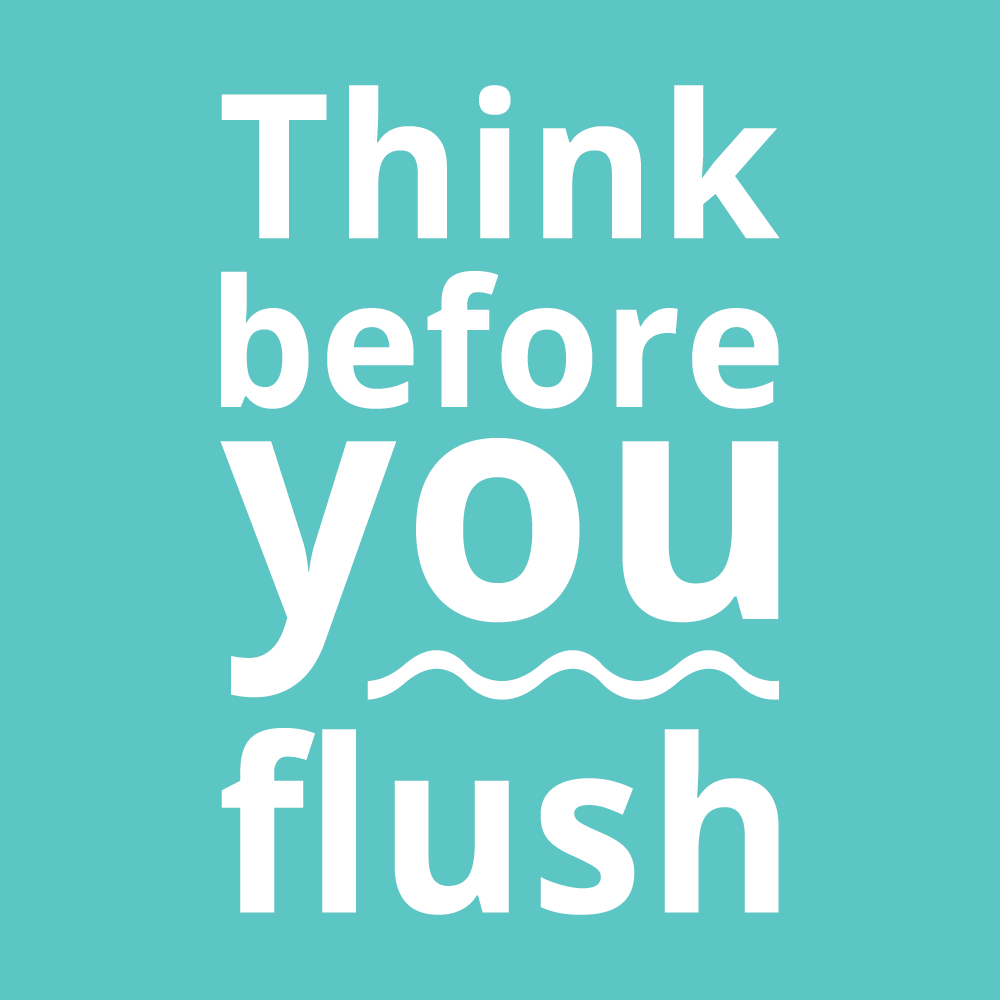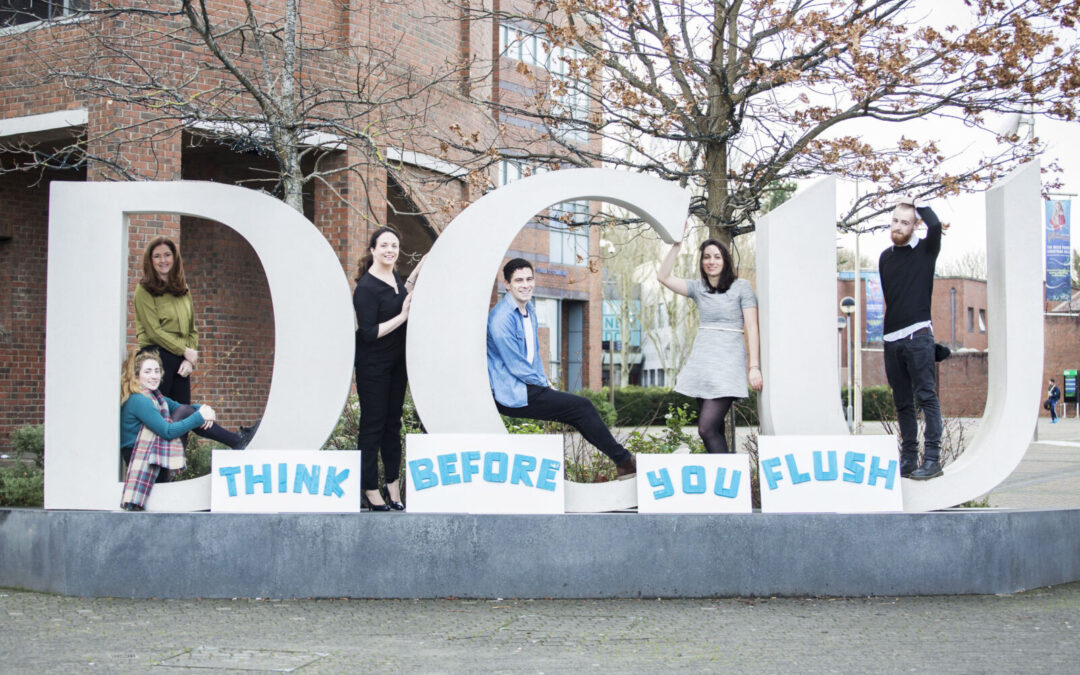Clean Coasts are delighted to announce the winners of the ‘Think Before You Flush’ Third Level Video Competition, supported by Irish Water. The competition asked third level students to create a video that ties into our new ‘Think Before You Flush’ campaign. Entrants competed over a €2,250.00 prize fund
‘Think Before You Flush’ is a public awareness campaign about the problem sanitary products and other items can cause in our marine environment and our wastewater systems if they are flushed down the toilet.
The difficult task of judging this year’s competition was undertaken by Micheal John O’Mahoney – Director, Environmental Education Unit, An Taisce, Deirdre O’Caroll – Green Campus Manager, An Taisce, Annabel Fitzgerald – Irish Water, Roisin Bradford – Irish Water, Mary O’Brien – Irish Water, Beckey Finn Britton – Digital and Social Media Officer, Clean Coasts, An Taisce. The people choice award was award to the view which received the most views during the 1st – 10th December on the Clean Coasts YouTube channel.
Winners 2015
| Award | Name | College | Video link |
| 1st Place | Ferdia Sean Mooney | DCU | https://www.youtube.com/watch?v=5q0SsiGtmgY |
| 2nd Place | Catriona Smiddy | UCC | https://www.youtube.com/watch?v=5y5SIDwRAMk |
| 3rd Place | Zac Milofsky | NCAD | https://www.youtube.com/watch?v=lBKLdA9MtCM |
| People Choice Award | Corey McLaughlin | DCU | https://www.youtube.com/watch?v=ZcAJf_FHR-I |
For more information about ‘Think Before You Flush’ campaign please visit www.thinkbeforeyouflush.org
Ends///
Marine Litter
Marine Litter includes a range of materials which have been deliberately discarded, or accidentally lost on shore or at sea. It includes materials that are carried out to sea from land, rivers, drainage, sewage systems and even by the wind.
Summary of Our Nation’s Flushing Behaviour Survey
Clean Coasts commissioned a survey of the nation’s flushing behaviour. We wanted to find out; Who disposes of waste in this manner?; What Sewage Related Litter) items do they dispose of?; Why do people flush items down the toilet?; What can be done to encourage a change in behaviour?
We wanted to understand the nation’s flushing behaviour and to do this we used the following metrics:
- Incidence levels within the Irish population of sewage-related littering;
- Reasons for littering in this way;
- Awareness of the implications of disposing of litter in this manner;
- Attitudes towards sewage-related littering
Who was surveyed?
1,033 adults aged 18+ were interviewed. Quotas were set and final data weighted to known national profiles of adults aged 18+ on age, gender, class and region to ensure that the sample is representative of the total Irish population.
What did we find out?
- 3 in 10 Irish adults have flushed items other than toilet paper down the toilet. This figure is higher among those under 35.
- Lack of knowledge is the primary reason for sewage-related littering among those who do so. The destructive nature of such behaviour is not common knowledge. 52% of sewage relating littering is a consequence of lack of knowledge.
- 40% thought it was ok to do so
- 33% did so for convenience
- 26% said it was only a small item
- 20% said there was no bin available
- 18% said it was too messy to dispose of in an alternative way
- 15% said it was out of habit
- 1 in 4 believe these items are chemically broken down
- 1 in 2 thinking they just disintegrate following flushing.
- The top items incorrectly disposed of are:
- Baby wipes 58%
- Facial wipes 40%
- Cotton buds 26%
- Tampons 24%
- Cigarette butts 21%
- Plasters 18%
- Condoms 18%
- Food 15%
- Medicines 12%
- Sanitary pads 6%
- Tampon applicators 5%
- Toilet roll tube 4%
- Nappies 2%
- Cotton wool 1%
- Dental floss 1%
- 6 in 10 stated that they have flushed baby products down the toilet, with baby wipes being the number one item cited by all adults – this figure is slightly higher among women.
- Female hygiene products are only mentioned by 3 in 10 of our total sample rising to over 1 in 2 for females only.
- Males on the other hand over-index on disposing of cotton buds, cigarettes, plasters and condoms.
What are people’s attitudes to sewage related littering?
- 90% agreed – “Seeing sewage related litter during a visit to the beach in Ireland would disgust me”
- 90% agreed – “We need more education about where items other than toilet paper which are flushed down the toilet end up to make sure that less people dispose of waste in this way”
- 84% agreed – “If I knew that the items flushed down the toilet could end up being discharged in to the ocean and could pollute our coastline and cause potential health risks I would not dispose of items in this way”
- 78% agreed – “Flushing items other than toilet paper down the toilet damages our environment”
- 12% agreed – “Flushing items other than toilet paper down the toilet is acceptable”
When it comes to encouraging people not to engage in sewage-related littering, 1 in 4 of the total sample suggest demonstrating the consequences of such behaviour is the way to go, with 1 in 3 who have done so endorsing this option.
Clean Coasts
Clean Coasts Ireland is owned and operated by the Environmental Education Unit of An Taisce – the National Trust for Ireland. It is funded by the Department of the Environment, Community & Local Government, Coca-Cola and Fáilte Ireland. It has been operating in Ireland for 11 years and engages 437 Clean Coasts groups and thousands of beach users. The Green Coast award is also part of the Clean Coasts programme and is an award for beaches that have excellent water quality but may not have the necessary built infrastructure to be eligible for the Blue Flag award. www.cleancoasts.org
Irish Water
Irish Water (www.water.ie) is the new national water utility responsible for providing and developing water services throughout Ireland. Incorporated in July 2013 as a semi-state company under the Water Services Act 2013, Irish Water will bring the water and waste water services of the 31 Local Authorities together under one national service provider. The purpose of Irish Water is to safeguard water as a precious natural resource and to deliver water services in a way that protects the environment and meets the needs of all citizens and industry now and in the future.
Irish Water will be accountable to two regulatory bodies – the Commission for Energy Regulation (CER) which is the economic regulator for the water industry, and the Environmental Protection Agency (EPA) which is the environmental regulator.
Irish Water is a registered subsidiary company of Ervia (www.ervia.ie)

